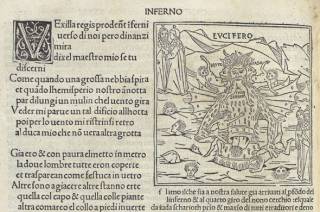Topic(s)
Mathematics, astronomy, medicine, theology, literature, and astrology.
Extent
179 individual works.
Scope and content
An important collection of books printed before 1501. Subjects include mathematics, astronomy, medicine, theology, literature and astrology. Most were presented to the Library by generous benefactors over the years, though some were purchased. Highlights include the 1477 Vendelin de Spira of Venice edition of Dante's Divina Commedia, the first illustrated edition of the same work printed by Nicholas de Lorenzo in Florence in 1481, a 1493 edition of the Nuremberg Chronicle (given by Jeremy Bentham), the editio princeps of Euclid published by Ratdolt in Venice in 1482, and a handpainted herbal printed in Padua in 1485.
History

The largest proportion of incunabula (83 volumes of 105 single works) are from the library of Professor John Thomas Graves. These are exclusively on early science, especially mathematics and astronomy. The second largest collection comes from the library of Charles K. Ogden (24 volumes, all single works) and covers a wide range of unusual subjects, including theology, witchcraft, history and literature. The remainder of the collection was given by, or bought from the libraries of many distinguished collectors and scholars:
- Frederick Mocatta (8)
- Sir Herbert Thompson (8)
- Walter Seton (4)
- the Hertfordshire Natural History Society (2)
- Sir John Rotton (2)
- Samuel Sharpe (2)
- Jeremy Bentham (1)
- Professor R.W. Chambers (1)
- Professor R.E. Grant (1)
- The Guildhall Library (1)
- Helga Hacker (1)
- Professor T.G. Hill (1)
- Professor T.H. Key (1)
- James Morris (1)
- Samuel Parr (1)
- Professor Egon Pearson (1)
- Huxley St. John Brooks (1)
- Professor Sir John Tweedy (1)
Access
The collection is fully catalogued. To browse the records, conduct a shelfmark search for INCUNABULA on Explore. Our holdings have also been added to the Incunabula Short Title Catalogue (ISTC). To see the full list, conduct a holding institution search for "London, University College".
Image: Dante Alighieri, La commedia (INCUNABULA QUARTO 5 o)
 Close
Close

